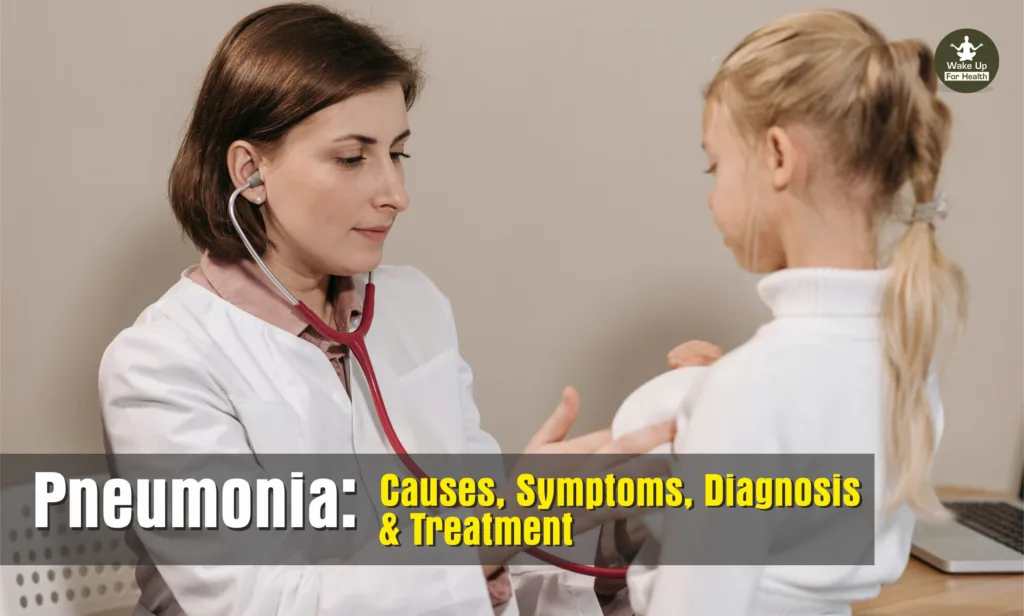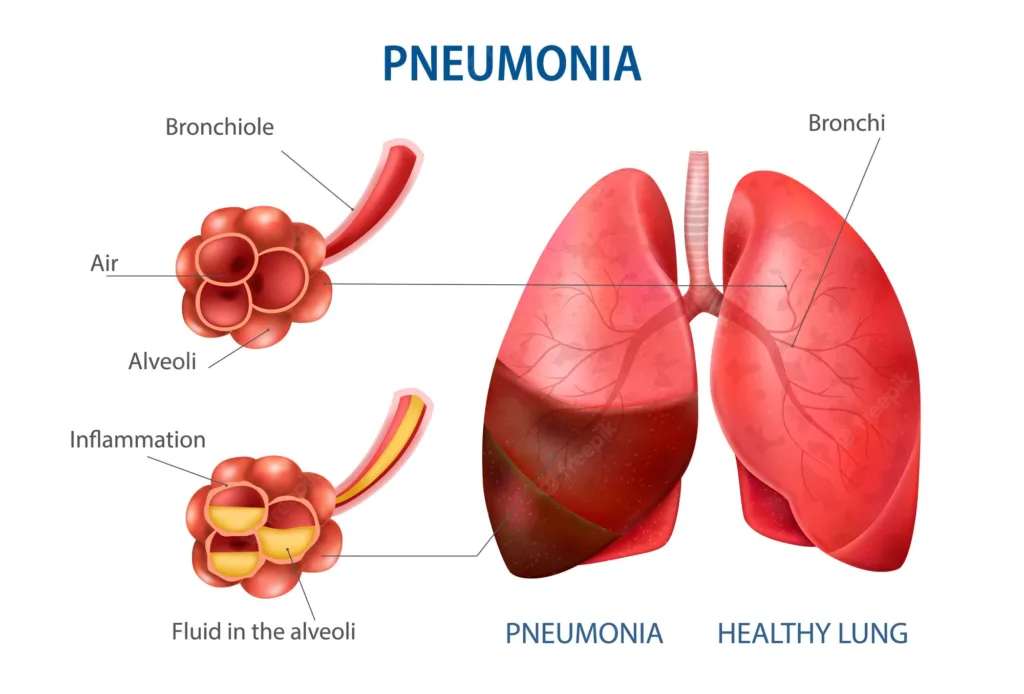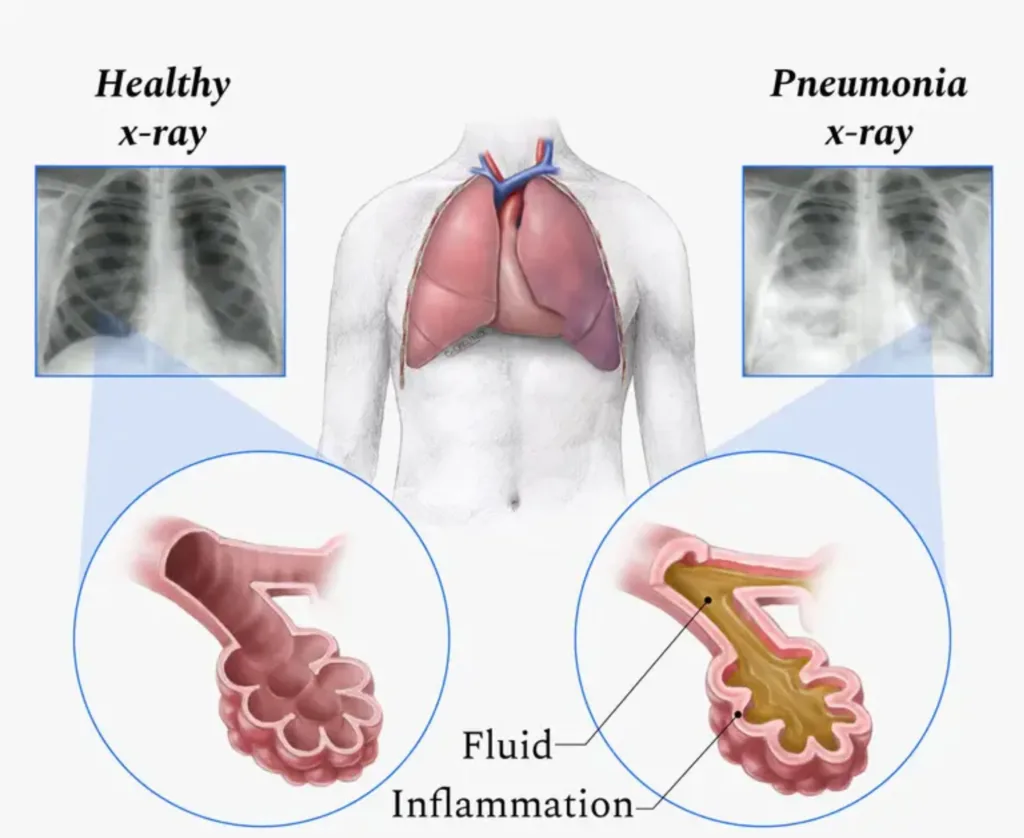As soon as the winter season starts, the possibilities of increasing diseases related to cold and cough also increase. Usually we get cured from cold and cough, but there are some diseases which show more outbreaks in winter. Pneumonia infection is one of them.
Pneumonia is a serious disease affecting the lungs. When suffering from this, the lungs get filled with water and there is swelling in it. This disease can occur in one or both lungs. The name of bacteria and virus comes first in the real causes of pneumonia.

When pneumonia occurs, the air sacs in the lungs get filled with air or pus. Because of this, the patient has difficulty in coughing and breathing. Also, there may be chest pain. If this disease is not treated on time, it can even lead to the death of the patient. Today in this special article, we will discuss in detail about what is pneumonia, its causes, symptoms, diagnosis and treatment.
Pneumonia: Understanding Its Causes, Symptoms, and Treatment
Infection in the lungs is called Pneumonia. This causes a condition of inflammation in the lungs. Pneumonia is mainly caused by viral and bacterial infections. It can also be caused by viruses, bacteria and parasites. In addition, it is less likely to be brought on by medication interactions, other illnesses, or infection with other bacteria.
Also, if we talk about the conditions and factors that promote pneumonia, then smoking, reduction of patient immunity, excessive drinking, severe lung disease, severe kidney disease and liver disease are included. Apart from this, the use of certain drugs such as proton-pump inhibitors or H2 blockers is also likely to increase the risk of pneumonia. The risk of pneumonia also increases in old age. Aside from this, those with lung conditions including bronchiectasis, asthma, and heart disease are at a higher risk of developing pneumonia.
How many types of pneumonia are there?

There are five types of pneumonia which include bacterial pneumonia, viral pneumonia, mycoplasma pneumonia, aspiration pneumonia and fungal pneumonia.
1. Bacterial Pneumonia
This type of Pneumonia is caused by various bacteria such as Streptococcus Pneumoniae. The body becomes weak due to this bacteria. Bacterial Pneumonia can be caused due to lack of nutrition, some kind of disease or old age, etc., when infected with bacteria. This pneumonia can happen to a person of all ages.
2. Viral Pneumonia
It is caused by influenza (flu) as well as by various viral. A patient suffering from viral pneumonia is at a higher risk of getting bacterial pneumonia.
3. Mycoplasma Pneumoniae
This type of pneumonia is caused by a bacterium called Mycoplasma pneumoniae.
4. Aspiration Pneumonia
Aspiration pneumonia is caused by some kind of food, liquid or sunlight. Many times a lot of difficulties may have to be faced in curing this type of pneumonia.
5. Fungal Pneumonia
Fungal Pneumonia occurs at various places or due to certain reasons such as fungus etc.
What are the symptoms of Pneumonia Infection?
To identify any disease, it is very important to know its symptoms. In such a situation, if the symptoms of a serious disease like pneumonia are recognized on time, then the treatment becomes easier. Know the symptoms of pneumonia.
Like other diseases, pneumonia also has certain symptoms. With the help of these symptoms, you or your doctor can get an idea that you have pneumonia.
The main symptoms of pneumonia may include:
• Cough
• Weakness
• Feeling Tired
• Cough with Mucus
• Fever
• Feel Anxious
• Loss of Appetite
• Sweating and Shaking
• Difficulty in Breathing
• Having Chest Pain
• Trying to Breathe Faster when, You are out of Breath.
If you see the above symptoms in yourself or any member of your family, then a doctor should be consulted immediately.
Risk Factors of Pneumonia.

There are many risk factors that increase the chances of Pneumonia. The main risk factors for pneumonia include:
• Smoking
• Being malnourished
• Being over 65
• Suffering from lung related problems like bronchitis and asthma etc.
• Complications of stroke
• Upper respiratory tract infection
• Suffering from heart disease, organ transplant or due to which the body is weak.
The above mentioned risk factors increase the risk of pneumonia. If you can associate yourself with the above points, then you should consult a doctor and talk about its prevention.
How to Diagnose of Pneumonia?
Pneumonia can be identified with the help of some common symptoms. But to confirm its exact cause and severity, the doctor may suggest special tests. Doctors may suggest the following tests to diagnose pneumonia:
1. Blood Test
Doctors do blood tests to find out about the cause of pneumonia.
2. Chest X-Ray
Pneumonia affects the lungs. Doctors do an X-ray of a patient’s chest to confirm inflammation in the lungs.
3. Sputum Culture
During this test, the doctor examines the patient’s mucus to find out the cause of the infection.
4. Pulse Oximetry
During this process, doctors find out how effectively the patient’s lungs are sending oxygen to his blood.
5. City Scan (CT Scan)
During this test, the doctor can clearly see the picture of the patient’s lungs. This helps them to better understand the condition of the lungs.
6. Fluids Sample
With the help of this test, doctors try to find out the cause of pneumonia.
With the help of all these tests, the doctor gets to know the exact cause of pneumonia, after which the selection of the means of treatment and the treatment process begin.
Treatment of Pneumonia.
The treatment of pneumonia depends on its cause. If the cause of pneumonia is bacterial, the doctor may prescribe antibiotics to the patient. Also, antiviral drugs may be prescribed in case of viral pneumonia.
If the cause of pneumonia is fungal, the doctor may suggest antifungal medications. Along with prescribing medicines, doctors suggest taking maximum rest and keeping the body hydrated. In addition to all these, in some cases the doctor may also use intravenous antibiotics, respiratory therapy and oxygen therapy.
When should one be hospitalized for Pneumonia infection?
After medical consultation, if the doctor feels that you need to be admitted to the hospital, then they recommend admission. Although there are various situations in which the patient is likely to be admitted to the hospital, they are as follows.
• If the age of the patient is less than 5 years and more than 65 years.
• If the patient is confused about the place, time and person.
• If there is severe shortness of breath.
• If the patient’s temperature is up to 105°F.
• If the heart beat rate is less than 50 or more than 100.
What is the ways to Prevent Pneumonia Infection?
Pneumonia is primarily preventable through vaccination after birth. In this, vaccines called PVC13 for infants and PPSV23 for children and adults are given. Pneumonia can be avoided through distance from smoking, keeping cleanliness, wearing masks, taking nutritious diet, exercise, yoga in other ways to prevent pneumonia.
(Disclaimer: This article is for general information only. It is just to wake you up for your health purpose. Out intension is not to mislead or It cannot in any way be a substitute for any medicine or treatment. Always contact your doctor for more details.)